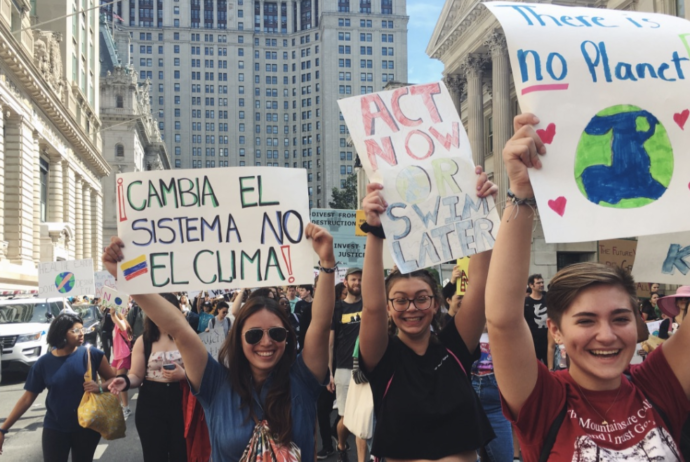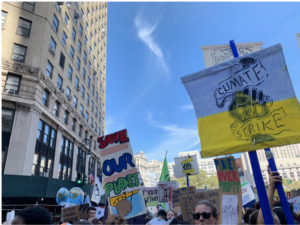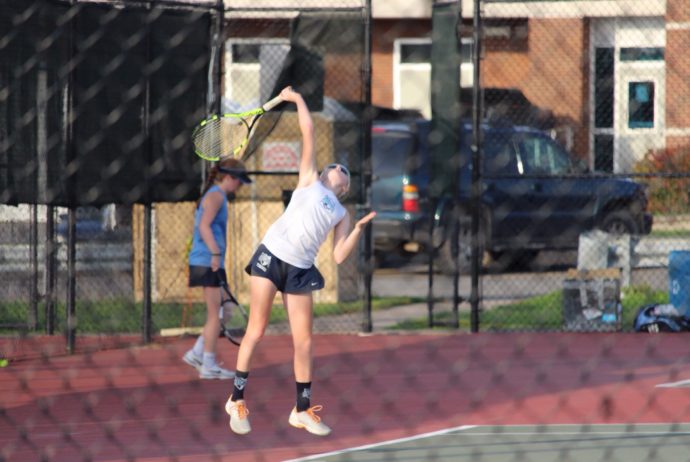Fighting a Meltdown: Sem Students Participate in Protest to Promote Climate Change Awareness
By Shailee Desai ‘21, Kate Getz ‘21, and Rhianna Lewis ‘22
Change in Earth’s climate has been a common phenomenon in the history of this planet. According to NASA, in the last 650,000 years, there have been seven different cycles of glacial advances and retreats, but the end of the last ice age marked the beginning of one of the most significant climate periods in history: the modern climate era.
The modern climate era consists of unprecedented warming trends, which are more than ninety-five percent likely caused by human activity. This means that our actions as a human race are destroying the planet we call home as we speak; scientific societies and agencies based around the world all agree: human use of fossil fuels, human destruction of ecosystems, and human emphasis on production over planet is what is causing rising sea levels, unprecedented natural disasters, and species extinction. By 2030, the effects of our actions will be irreversible.
“World leaders must act now, so we can have a future.”
Over the past year, teen activists have been leading the movement for climate advocacy all across the globe. Most recently, 16 year old teen idol Greta Thunberg travelled from Sweden by boat to New York City on September 20 to lead a strike as a part of her “Fridays for the Future” campaign. Some members of the Sem community, including Abby Price ‘21, travelled to NYC to participate in the march.
As leader of Sem’s Environmental Club, Price’s main motivation for going to the march was her passion about climate justice. Here are some of her thoughts on her experience:
Describe the environment at the march.
“Everyone at the march was very passionate about the strike. There were many cheers and chants that we yelled in protest. The march was lead by a group of teenagers, but there were people of all ages who were striking. After the march, we listened to some amazing speakers, who were both informative and passionate.”
What do you personally think is the worst issue with climate change right now?
“I think that the worst issue surrounding the climate crisis is that world leaders are not aggressively trying to lower their carbon emissions. If the carbon emissions aren’t reduced, climate change will be irreversible by 2030.”
What was the most important lesson you learned from the experience?
“The message I got from this experience, and the message I hope the world leaders got as well, [is that] although the younger generation is rising, by the time today’s teenagers will be able to implement change, the climate crisis will be irreversible. World leaders must act now so we can have a future.”
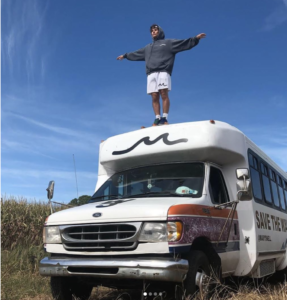
Joshua Snell poses on top of his bus in which he travels across the country. (photo courtesy of @wavysnell on Instagram)
“We need to stop waiting for someone else to do something and do it ourselves.”
Greta Thunberb is not the only young adult dedicating her life to saving our planet. Saying that Joshua Snell, older brother of Sophia Snell ‘22, is taking a personal step to fight climate change would be an understatement; Snell, age 21, is spending his life on a bus travelling around the country until he can raise $1,000,000 for the Ocean Conservancy, the number one leader in Ocean protection, cleanup, and conservation. The Opinator was given the opportunity to interview Snell (better known as WavySnell):
What inspired you to start this project?
“The amount of plastics that are in, and continue to enter our oceans is what inspired me to start this project. Someone needs to take a stand. Someone has to be the voice for our Oceans!”
Describe your typical day on the road.
“My typical day on the road consists of me waking up near the beach. I eat oatmeal every morning, catch up on emails, and plan for the day/near future. Then, I go to Planet Fitness, workout/shower, then try to promote myself and the project for the day. Sometimes, I’ll have an event or pop-up planned, but if I don’t then we spend our day in that area talking to local people and shops!”
Staying on the road until you can raise at least 1 million dollars is not an easy task at all. How do you stay motivated despite the difficulties you face throughout your journey?
“My motivation comes from all the people that I inspire, the people who look up to me as an inspiration! Yes, sometimes it’s hard, but most of the time it’s fun. I enjoy being on the road and having a crazy goal to accomplish. I’ve never really been much of an environmental activist, but these issues are what mainly keeps me motivated every day. So I thought why not go for it and do something that many people haven’t seen before.”
In a world in which not everyone believes that global warming exists, how can we spread awareness about not only your project, but also about climate change and ocean conservation in general?
“Have peaceful and reasonable conversations with people. Talk about the facts and statistics that show climate change is real. There are so many people out there that have trouble understanding what’s really happening in our world, and I think my drive and passion is what really makes people believe it’s true.”
What are every-day steps individuals can take to help clean up our planet?
“Just be mindful. Pay attention to your carbon footprint. Try to eliminate as many single use plastics out of your routine as possible. Sometimes that’s as easy as using a reusable water bottle or coffee cup and a reusable bag for groceries. If you were to use a plastic water bottle, be sure to dispose of it properly into a recycling bin. It makes a huge difference.”
What would you say in specific is the singular biggest threat to our planet right now? (Increasing use of fossil fuels, lack of support from politicians, disbelief in science, etc.)
“I’d say, our biggest threat to our planet right now is ourselves. Humans. We need t
o stop waiting for someone else to do something and do it ourselves. Don’t think that being just one person, you can’t make a difference because you can and you will. Educate yourself on ways to prevent your carbon footprint, and practice living an eco friendly life. Also, don’t lose hope! You have to believe in humanity, we can turn things around. :)”
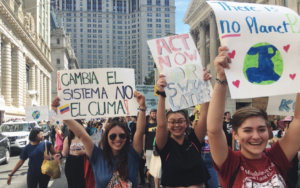
Nathaly Flórez, Abby Price ‘21, and Rhianna Lewis ‘22 with their signs at the march (Photo courtesy of Abby Price)
What can you do?
The climate crisis isn’t going to magically remediate itself overnight, but every little action helps. Here are some ways you can reduce your carbon footprint and take a step to stop global warming:
- Get rid of single-use items made of plastic like water bottles, straws, bags, and silverware. Invest in a reusable water bottle, and use the filling stations all over campus.
- Recycle! Put any paper, plastic, and aluminum in their respective cans to help minimize the amount of waste in our trash cans.
- Drive less to help lower the number of emissions in the atmosphere. Carpooling, taking your bike, using public transportation, or even walking helps lower the number of emissions and makes the air we breathe cleaner and safer.
- Be conscious of water usage. Make sure the water is off while you’re brushing your teeth or after you’re done taking a shower. Conserving water is one major way to reduce climate change.
Needless to say, these steps are not enough to end the global warming crisis immediately, but they can help mitigate the effects. It’s time we stop ignoring the facts: climate change is real, and we need to do our best to fix a mess we’ve caused.
